Currently reading
Along for the ride with The Passenger


Fun and suspenseful, Lisa Lutz's story was an intense experience. I loved it. I loved the characters. I even loved the deeply flawed plot. There are many things in this story that don't make sense and aren't tied up at the end (despite the impression that they are), and I could go into great detail here, but they didn't spoil the experience for me. The suspense in the novel depends on the main character and narrator, whose name keeps changing, keeping things from us as she tells us her story. She drew me into her story, but once she had gained my trust and my empathy, I wondered why she kept hiding things from me. In the end, though, I came out cheering for her, happy to have lived in her story a while. It was a great ride.
I got a free copy of this from Net Galley.
 1
1
The Language of Secrets (Rachel Getty and Esa Khattak Novels)
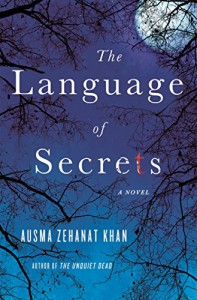 The Language of Secrets is well-written. It's suspenseful and treats its characters with humanity and kindness, which I appreciate as a reader. The cultural truths explored in it are sobering and fully treated. At times it is beautiful. I'll look forward to reading the next one in the series.
The Language of Secrets is well-written. It's suspenseful and treats its characters with humanity and kindness, which I appreciate as a reader. The cultural truths explored in it are sobering and fully treated. At times it is beautiful. I'll look forward to reading the next one in the series.There are a couple downsides. It's really not funny. Not even a little bit for an instant. And nothing goes as it should; everything is frustrating and there's little resolution at the end. I suppose that makes it realistic, but it also makes it a less satisfying read. Maybe I'm being shallow, but I'm left with a taste of dissatisfaction anyway.
As the author notes in the afterword, the story is loosely based on a terrorist plot that was thwarted in Toronto in 2006, and a great deal of research is evident throughout the story. Khan is a gentle storyteller, educating her audience without blaming us for our ignorance. The main character's role as a Muslim Detective investigating Muslims is problematic and confusing from every angle. Stories like these definitely need to be told. But a lighthearted moment or two wouldn't ruin them.
I got a free copy of this from Net Galley.
The Heart
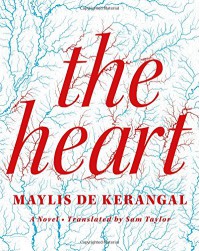 A captivating prose poem. It weaves in and out of the heads of the various characters. Some are in anguish on a day that will change their lives, some in a snapshot of an intense day at work. The plot can be summarized in a single sentence, so it is more a book of emotion than of action. Incredibly beautiful.
A captivating prose poem. It weaves in and out of the heads of the various characters. Some are in anguish on a day that will change their lives, some in a snapshot of an intense day at work. The plot can be summarized in a single sentence, so it is more a book of emotion than of action. Incredibly beautiful.I got a free copy to read ahead of the English publication from Net Galley.
Shylock Is My Name (Hogarth Shakespeare)
 [I'm going to talk about the whole book. I don't believe there are any spoilers since this is a retelling of a well-known tale and hardly relies on suspense. But if you don't want to know any details of how the retelling is done, it's probably best you don't read this.]
[I'm going to talk about the whole book. I don't believe there are any spoilers since this is a retelling of a well-known tale and hardly relies on suspense. But if you don't want to know any details of how the retelling is done, it's probably best you don't read this.]For me, the Merchant of Venice is captivating because of two remarkable and problematic characters: Shylock and Portia. I don't think I'm alone in this, but it's clear that Jacobson does not share my opinion. He clearly thinks of Portia as a throw-away character, and because of this fundamental disagreement, I was bound to be disappointed by his adaptation. For Jacobson, MoV was Shylock, all Shylock, and his telling of the story re-orients around Shylock and the relationships in the story that define his character. The principle relationships in this story are between Shylock and his daughter Jessica, and Shylock and Anthony. Both place a remote second to the relationship between Shylock and himself.
There is much to think about and to discuss in this book, and for that I rate it fairly high. It is, however, not an enjoyable book to read. Shakespeare's play is not enjoyable because it is so problematic, and Jacobson's retelling is not enjoyable because the author so clearly holds all of his characters in disdain. We cannot develop empathy for any of them because the author holds none. MoV is categorized a comedy because they don't all die at the end, but it is decidedly unfunny, which makes me inclined to forgive the Golden Globes and their strange interpretation of what a comedy is. In an echo of this categorization, Jacobson's characters exchange jokes and are either often laughing (the Christian characters), or never laughing but rather overanalyzing their jokes and why they tell them (the Jewish characters), but it is also not a comedy in any sense of the word in modern usage.
The core of the book is wrapped up in Jewish identity and relationships to the extent that much of the plot does not make sense, and I had to release my expectation of logic in order to consider what the author was trying to get across. Despite the references to email and phones, reality television and social media, this classic story has not been dragged successfully into the 21st century. At 15, Strulovitch's (the modern Shylock's) daughter was in college, and at 16 was of age and free to marry. Circumcision is treated as the defining mark of Jewish men instead of the norm it is today. The characters seem incapable of using their modern technology to either solve problems or communicate (the letter is written, addressed, and hand-delivered). And Strulovitch is portrayed as having just as isolating a life in modern England as Shylock did in 16th century Italy, and this is unbelievable. All these inconsistencies drove me mad and inclined me to give the book a much lower rating, but let's get to the relationships.
Strulovitch finds the fictional Shylock in a cemetery in the first scene of the book and takes him home with him to serve as his advisor, his mentor, his conscience. The fictional Shylock is visible to humans in the story but not Strulovitch's dogs. He is constantly in conversation with his dead and absent wife, Leah, and bemoaning his lost relationship with his daughter Jessica. Strulovitch's wife Kay is bedridden after a stroke and is not available to her husband for counsel, her living mind silenced while Leah counsels Shylock from beyond the grave like a silent Lady MacBeth (I do not exaggerate -- it is on her advice that Shylock decides to drive Strulovitch to rage). The debates between Strulovitch and his conscience Shylock drive the story and define Jewish male identity. They are the central story. They are foreign and extreme to me, but worth reading and considering.
Strulovitch further explores his identity through his relationship with his daughter Beatrice and D'Anton, the art trader from whom he, in the end, demands a little flap of flesh. In an exception to all other characters in the story, Beatrice is actually a little more interesting than her counterpart Jessica, in that she is allowed to think for herself after fleeing her father's home with her lover. But all of her thoughts are about her father and how maybe he was right, so this extra level of interest circles back to keep Strulovitch central. In an interesting and appropriate tweak, Strulovitch and D'Anton are far more similar to each other than Shylock and Anthony, both in profession and in character. They live near each other and move in the same circles, albeit very seldom interacting. They should understand each other; they do not that the excuse of foreignness and removal. Their interaction makes this adaptation more intriguing.
All of this is good for mental mastication, but then Jacobson reveals his real motivation at the end. Shylock (not Strulovitch -- let's not beat around the bush) delivers Portia's mercy speech for her and then tells her off. Or rather, he tells the empty-headed, shadow-of-a-character Plurabelle off. And it feels like this was what it was all about, and it doesn't matter that it's modern but not modern and the plot doesn't make sense and the characters are strangely told. It's all really about Shylock telling that damn Portia off. Jacobson first guts her and then flattens her, all to make it easier to crush her beneath his boot heel. So you could argue that I only object because I'm a woman and a feminist who has studied Shakespeare and thought there was some value in Portia as a character despite her anti-Semitism, and you'd be right. And maybe my position is untenable and unforgivable. It's worth discussing. But I think it makes Jacobson's story problematic in and of itself, not because of wit and wisdom, but because of a cultural blindspot, much like the original. So maybe that makes it an appropriate retelling after all.
I got a free copy of this from First to Read.
 1
1
Feather Brained: My Bumbling Quest to Become a Birder and Find a Rare Bird on My Own
 Feather Brained is quite simply entertaining. Tarte relates 20 years of stories related to birds as he observes them in the backyard, chases them across the state of Michigan, and feeds them as part of a rescue operation in his home. He's self-deprecating in a hyper-competitive hobby, and takes his time getting to know the birds and birders of Michigan, losing interest often but then catching the the fever again. As much as it is a story about Bob and birds, it's a story of Bob and his wife Linda, who seems quirky and lovely, and there are moments in the book that pass as a love letter to her. The changes of pace make the book work. There are reverent moments of awe and love, goofy mishaps, snooty birders, hilarious understatement, obscure pop culture similes, and eye-popping descriptions of their animal-dominated home. All in all one of the most enjoyable nature books I've read.
Feather Brained is quite simply entertaining. Tarte relates 20 years of stories related to birds as he observes them in the backyard, chases them across the state of Michigan, and feeds them as part of a rescue operation in his home. He's self-deprecating in a hyper-competitive hobby, and takes his time getting to know the birds and birders of Michigan, losing interest often but then catching the the fever again. As much as it is a story about Bob and birds, it's a story of Bob and his wife Linda, who seems quirky and lovely, and there are moments in the book that pass as a love letter to her. The changes of pace make the book work. There are reverent moments of awe and love, goofy mishaps, snooty birders, hilarious understatement, obscure pop culture similes, and eye-popping descriptions of their animal-dominated home. All in all one of the most enjoyable nature books I've read.I got a free copy of this from Net Galley.
Into the Magic Shop: A Neurosurgeon's Quest to Discover the Mysteries of the Brain and the Secrets of the Heart
 This story will make you love Ruth. And like little Jim and root for him. And then hate big Jim. And then come to like big Jim again.
This story will make you love Ruth. And like little Jim and root for him. And then hate big Jim. And then come to like big Jim again.
Jim Doty has been both a good guy and a bad guy, and this book tells the story of his journey and encourages others to make the same journey toward good -- surely if a guy that selfish can make the journey, we all can. His primary aim is to make our lives better if we take his advice, but he has a warning against us taking the mechanics but not the spirit of the advice and using it selfishly -- we might turn into the incredibly wealthy arrogant s.o.b. he was before his transformation.
His narrative is thick with a sort of metaphysics, something in common with "the secret" that made the pop self-help rounds a few years ago -- envision it, demand it of the universe, and it's yours, anything you want. I'm not really on board with this, and I think in many cases this guy just lucked out. The people who envisioned it, demanded it of the universe, and didn't get it don't write books. And maybe they're angry, and/or maybe they're much better people than pre-transformation Jim was. But the story here is skewed, and I'm not sold on how effective he says these things are in getting us what we want, making the magic envelope of money appear when we need it or admitting us into the program we really want even when all the rules say we shouldn't get in. So don't read it for advice on how to get anything you want in the world.
But here's the key thing: that's not really the important part of this book, as central as it is to the details of Doty's story. Meditating, calming our bodies, calming our minds, and being intentional in our goal-setting and goal-getting is good for all of us. Having open hearts and ears and focusing on kindness is good for all of us. And this book can remind us of all that. The middle part of Doty's story -- the bad guy part -- is less important as proof of the magic he peddles and more valuable as a cautionary tale of what happens when our hearts and minds are closed off. We may have all the outward signs of success, but we're miserable people. In multiple ways.
So do read it. But read it for advice on how to live your best life, how a better life puts kindness front and center. It's not a how to get rich quick book, even though it feels like it halfway through. I recommend it. Read it. For the right reasons.
I got a free copy of this from Net Galley.
Naked Statistics: Stripping the Dread from the Data
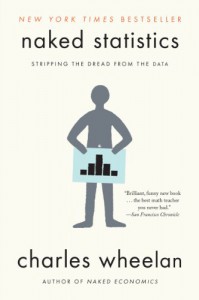 A very readable overview of the basic statistics that the average person sees in life. Yes, it's simplified, but it's also user-friendly for a general audience. Basics like mean/median, probability, and regression are covered.
A very readable overview of the basic statistics that the average person sees in life. Yes, it's simplified, but it's also user-friendly for a general audience. Basics like mean/median, probability, and regression are covered.
The Blue Line: A Novel
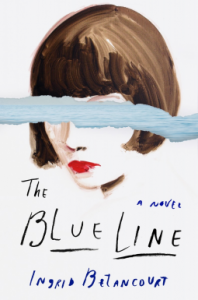 This is an astonishing work of historical fiction, weaving together the plotline as it jumps to and fro in time with history. Julia survives the Dirty War in Argentina to continue to Paris and then America, carrying her history with her. The most vivid passages are the hardest to read -- they detail torture techniques. The plot has to jump around so that it doesn't become so nauseating we can't continue. And the current-day plotline assures us that Julia gets out. Against all odds. And even stranger and harder to believe, the baby in her womb during that torture survives.
This is an astonishing work of historical fiction, weaving together the plotline as it jumps to and fro in time with history. Julia survives the Dirty War in Argentina to continue to Paris and then America, carrying her history with her. The most vivid passages are the hardest to read -- they detail torture techniques. The plot has to jump around so that it doesn't become so nauseating we can't continue. And the current-day plotline assures us that Julia gets out. Against all odds. And even stranger and harder to believe, the baby in her womb during that torture survives. There are literary and style bits I could criticize -- it's jumpy and awkward here and there. But the rich history, as awful as it is, makes up for these shortcomings. The book opens a window on a formative piece of the history of modern Argentina and Argentinians -- this struggle, for justice long delayed, continues today. Julia, a woman, a survivor, a warrior, a mother, is the right character to bring this story to us.
I got a copy of this from First to Read.
What Lies Between Us: A Novel
 This one broke me. I'm still trying to recover. It is beautiful and enveloping. No, not beautiful. It is terrifying. It is what the Romantics meant when they set their sights on the Sublime.
This one broke me. I'm still trying to recover. It is beautiful and enveloping. No, not beautiful. It is terrifying. It is what the Romantics meant when they set their sights on the Sublime.So read it, but only if you're feeling strong. There's child abuse, love dashed on the rocks, and madness.
Although the narrator's childhood is spent in Sri Lanka and there are vivid descriptions of life there, the main story line really isn't about Sri Lanka. It's a universal story and could be told anywhere. But it takes place in Sri Lanka and has elements of the immigrant experience and that enhances its individual character. So, universal and unique.
There is a quirky little thing, though. The author self-references. The characters in the book make a fleeting reference to the author's first book. A little weird moment that stuck out. It made me go hmmmm...
I got a free copy of this from Net Galley.
The Serengeti Rules: The Quest to Discover How Life Works and Why It Matters
 Sean Carroll is a fantastic decoder of the natural world. This book enumerates the different control mechanisms in nature, working more or less similarly on the molecular scale as on the ecological scale. The science of the interactions are very different, but the logic is the same -- double negative controls, for instance, in which an enabler really is just an inhibitor of an inhibitor, exist on both scales. Both the minute and the mega scales are complicated systems that are hard to manipulate if you have the tunnel vision of one variable at a time, as most research necessarily has (grants are easier to get if the problems are well-defined, even if the system isn't). He has some great stories, some of which I hadn't heard before at all. I could argue that a few of them are over-simplified, but Carroll is honest with his readers about when he does that and why. And he has his own story of visiting the Serengeti for the first time, which is lovely. He saves the best for last, so if you get bored with one particular story, skip ahead, don't put it down. The last story is about Gorongoza National Park in Mozambique -- that's worth sticking around for.
Sean Carroll is a fantastic decoder of the natural world. This book enumerates the different control mechanisms in nature, working more or less similarly on the molecular scale as on the ecological scale. The science of the interactions are very different, but the logic is the same -- double negative controls, for instance, in which an enabler really is just an inhibitor of an inhibitor, exist on both scales. Both the minute and the mega scales are complicated systems that are hard to manipulate if you have the tunnel vision of one variable at a time, as most research necessarily has (grants are easier to get if the problems are well-defined, even if the system isn't). He has some great stories, some of which I hadn't heard before at all. I could argue that a few of them are over-simplified, but Carroll is honest with his readers about when he does that and why. And he has his own story of visiting the Serengeti for the first time, which is lovely. He saves the best for last, so if you get bored with one particular story, skip ahead, don't put it down. The last story is about Gorongoza National Park in Mozambique -- that's worth sticking around for.I got a free copy of this from Net Galley.
Facing Climate Change: An Integrated Path to the Future
 Dr. Kiehl brings together three elements important in his life to explore reactions to global warming: Jungian psychology, Buddhism, and climate science. This mix is a little strange to the ear, but there are valuable insights in the text. It's hard to say who will benefit from this book. Those who need to read it the most, who fear making adjustments for climate change, will most likely not read it. Those most likely to read it are those who already believe that we should be facing climate change and making those changes. So in essence it will help us understand the fear that we are dealing with on the other side of the debate.
Dr. Kiehl brings together three elements important in his life to explore reactions to global warming: Jungian psychology, Buddhism, and climate science. This mix is a little strange to the ear, but there are valuable insights in the text. It's hard to say who will benefit from this book. Those who need to read it the most, who fear making adjustments for climate change, will most likely not read it. Those most likely to read it are those who already believe that we should be facing climate change and making those changes. So in essence it will help us understand the fear that we are dealing with on the other side of the debate. The reasoning here reminds me of that old joke about a psychologist changing a light bulb -- the light bulb really has to want to change. There is deep-rooted opposition to hearing the warning signs of global warming, and this book doesn't change that. The insight I felt was most inspiring for me was that we, meaning scientists aware of climate change, are called upon to make the invisible visible. We have a responsibility to bring a message of climate change to fearful people and to ask them how they're feeling while we're at it (nope, I've never done that, and I probably should). Even when people do take in the message that action is required, and now, there's only so much they can absorb because their brains are reeling with emotion. We could deal with that by ignoring it or denying it, but discussing it would be better for everyone involved.
I got a free copy of this from Net Galley.
What Is Fat For?: Re-Thinking Obesity Science
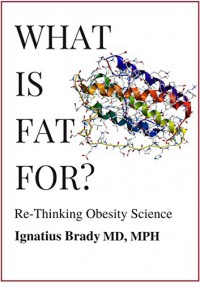 A fantastic summary of what we know about diets and weight loss from a reasonable doctor who knows what he's talking about. There are study and pop science book summaries. There are examinations of what might work better than others. And then he stops short of telling you what the big answer is. Because there is no big answer. We have an honest book, folks.
A fantastic summary of what we know about diets and weight loss from a reasonable doctor who knows what he's talking about. There are study and pop science book summaries. There are examinations of what might work better than others. And then he stops short of telling you what the big answer is. Because there is no big answer. We have an honest book, folks.That honesty probably means it won't appeal to your average dieter. But it should. He talks about the different roles of fat, carbs, and protein, about how protein is more important than you think it is and the other two less so. He also talks about the fact that all this is complicated beyond what others are willing to admit and that there's probably no one right answer.
Dr. Brady gives advice to his readers that he would give to his patients. He tells us to try a few things and to keep them up if they work and feel good and stop them if they don't. He then takes a good hard look at the weight loss medical industry to evaluate its value. And then a good hard look at obesity to analyze how worried about it we should be. His answer might surprise you.
This book is very well balanced and well written. Dr. Brady allows for the grey areas in this discussion. He admits it's complicated and there are no real good answers. That may make his book less popular in the marketplace, but higher ranked with me.
I got a free copy of this from Net Galley.
Why We Write About Ourselves: Twenty Memoirists on Why They Expose Themselves (and Others) in the Name of Literature
 The range of writers in this collection is impressive. There were some old favorites of mine and a few who were more or less new to me (I won't say which so I don't expose my own ignorance, immediately breaking a law of memoir writing...). The writers reflect on their own experience and give advice to those trying to write memoirs. And of course, they contradict each other. They have completely different paths to memoir-writing and give different advice. They have different opinions about how to do it best, what is more or less important in life than writing. So it's like the Bible. No matter who you are or what you're trying to write, you'll be able to find inspiration and justification in here. And those who disagree with you will, too.
The range of writers in this collection is impressive. There were some old favorites of mine and a few who were more or less new to me (I won't say which so I don't expose my own ignorance, immediately breaking a law of memoir writing...). The writers reflect on their own experience and give advice to those trying to write memoirs. And of course, they contradict each other. They have completely different paths to memoir-writing and give different advice. They have different opinions about how to do it best, what is more or less important in life than writing. So it's like the Bible. No matter who you are or what you're trying to write, you'll be able to find inspiration and justification in here. And those who disagree with you will, too.There are a few things they agree on, though. That writing is tough, and the good memoirs arise out of discomfort or pain. That shitty first drafts are important (and yes, Ann Lamott's is the best... of course it is...). That there's a big big big difference between a memoir and a diary. That they don't regret writing a memoir, however painful or wonderful it was.
If you love writers and writing, go on and read it. It will be time well-invested.
I got a free copy of this from First to Read.
A Survival Guide to the Misinformation Age: Scientific Habits of Mind
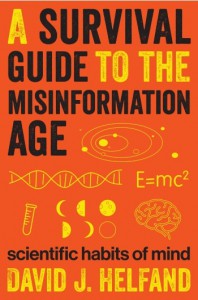 Dr. Helfand's book is based on his experience as an educator, and he is out to educate the country with this book. It makes for an excellent course of study, whether you're just interested in informally tuning up your info sorting or studying gen-ed level science. He covers what science is and what it isn't, and how scientists think and how that's different from patterns of thought elsewhere. He goes over how to represent data graphically and how to know that someone left something important out in their statistics. Then he goes over a few specific issues like global warming and autism and vaccinations. The appendices include some exercises in case you want to test yourself on some basic estimations and info processing (or in case a professor wants to use it in an unusual but useful gen ed class).
Dr. Helfand's book is based on his experience as an educator, and he is out to educate the country with this book. It makes for an excellent course of study, whether you're just interested in informally tuning up your info sorting or studying gen-ed level science. He covers what science is and what it isn't, and how scientists think and how that's different from patterns of thought elsewhere. He goes over how to represent data graphically and how to know that someone left something important out in their statistics. Then he goes over a few specific issues like global warming and autism and vaccinations. The appendices include some exercises in case you want to test yourself on some basic estimations and info processing (or in case a professor wants to use it in an unusual but useful gen ed class).I enjoyed Helfand's voice. He is very sure of himself and dismissive of people who aren't careful in their thinking, but somehow still explictly allows for reasonable people to disagree with him on the particulars. He has the voice of a teacher who is used to working with gifted but non-scientific students. He wants us to know that some answers are wrong and some are right, but also wants us to discovers the process of arriving at those right answers, not just the answers themselves. His is a welcome contribution to the effort to help us sort the good from the bad information in a time when both flood us everyday, and often every bit of info looks the same.
I got a free copy of this from Net Galley.
A Survival Guide to the Misinformation Age: Scientific Habits of Mind
 Dr. Helfand's book is based on his experience as an educator, and he is out to educate the country with this book. It makes for an excellent course of study, whether you're just interested in informally tuning up your info sorting or studying gen-ed level science. He covers what science is and what it isn't, and how scientists think and how that's different from patterns of thought elsewhere. He goes over how to represent data graphically and how to know that someone left something important out in their statistics. Then he goes over a few specific issues like global warming and autism and vaccinations. The appendices include some exercises in case you want to test yourself on some basic estimations and info processing (or in case a professor wants to use it in an unusual but useful gen ed class).
Dr. Helfand's book is based on his experience as an educator, and he is out to educate the country with this book. It makes for an excellent course of study, whether you're just interested in informally tuning up your info sorting or studying gen-ed level science. He covers what science is and what it isn't, and how scientists think and how that's different from patterns of thought elsewhere. He goes over how to represent data graphically and how to know that someone left something important out in their statistics. Then he goes over a few specific issues like global warming and autism and vaccinations. The appendices include some exercises in case you want to test yourself on some basic estimations and info processing (or in case a professor wants to use it in an unusual but useful gen ed class).I enjoyed Helfand's voice. He is very sure of himself and dismissive of people who aren't careful in their thinking, but somehow still explictly allows for reasonable people to disagree with him on the particulars. He has the voice of a teacher who is used to working with gifted but non-scientific students. He wants us to know that some answers are wrong and some are right, but also wants us to discovers the process of arriving at those right answers, not just the answers themselves. His is a welcome contribution to the effort to help us sort the good from the bad information in a time when both flood us everyday, and often every bit of info looks the same.
I got a free copy of this from Net Galley.










